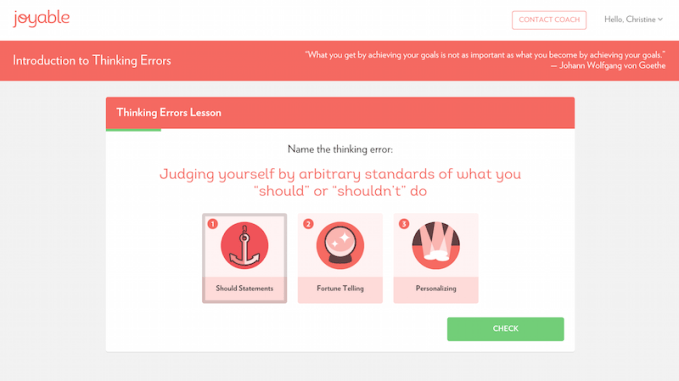5. Focus on getting better, rather than being good.Read more in HBR.
Tuesday, March 31, 2015
Stanford Open Office Hours: Kelly McGonigal
"Published on Dec 11, 2013. For all the joy they bring, the holidays can be stressful. In this session of Stanford Open Office Hours, health psychologist Kelly McGonigal, PhD '04, provides advice on navigating the upcoming season with compassion, poise and willpower."
How curiosity saved his life
Thanks, +Will Patrick
The Healing Power of Your Own Medical Records
Check out this mindblowing NYT article. Could you catch your own brain cancer before the doctors do? Medical records & big data of the future.
Stanford Open Office Hours: Dave Evans and Bill Burnett
Most people don't know what they are passionate about. So what do you do now? Dave Evans and Bill Burnett have some ideas.
Economic Inequality: It’s Far Worse Than You Think
The great divide between our beliefs, our ideals, and reality. An excerpt:
In their 2011 paper, Michael Norton and Dan Ariely analyzed beliefs about wealth inequality. They asked more than 5,000 Americans to guess the percentage of wealth (i.e., savings, property, stocks, etc., minus debts) owned by each fifth of the population. Next, they asked people to construct their ideal distributions. Imagine a pizza of all the wealth in the United States. What percentage of that pizza belongs to the top 20% of Americans? How big of a slice does the bottom 40% have? In an ideal world, how much should they have?
The average American believes that the richest fifth own 59% of the wealth and that the bottom 40% own 9%. The reality is strikingly different. The top 20% of US households own more than 84% of the wealth, and the bottom 40% combine for a paltry 0.3%. The Walton family, for example, has more wealth than 42% of American families combined.Read more in Scientific American.
Stanford's Most Popular Class Isn't Computer Science--It's Something Much More Important
It's called "Designing Your Life," a course that's part throwback, part foreshadowing of higher education's future. Read more in Fast Company.
And +Kanyi Maqubela had a shout out in there! Go PA.
And +Kanyi Maqubela had a shout out in there! Go PA.
Monday, March 30, 2015
For women in VC, let’s stop citing the 4 percent [VCJ Editor’s letter]
Read more in PE Hub. (Seems like the answer is more like 5-11% women.)
Ellen Pao and the Sexism You Can’t Quite Prove
An excerpt:
It happens all the time when my husband and I are at work events together. Cocktail Party Guy asks my husband about how things are going at his news site, and he answers. Then Cocktail Party Guy asks me how our dogs are, and I answer, before pivoting the conversation back to work — and later rolling my eyes as we walk away. It is not impolite. It is not inappropriate. But it is still, at least in my mind, sexist. Both me and my husband love our work. Both me and my husband love our dogs. One of us gets asked about our work. One of us gets asked about our dogs.
It is a form of soft discrimination that I fear might be all too familiar to all too many women — and often I find it hard to explain to my male friends and colleagues. Occasionally, I even find myself struggling to convince them that it is discrimination, and that it has consequences.Read the NY Magazine post.
Career Decisions
Serial Entrepreneur Elad Gil identifies his top four factors to consider when evaluating the next step in a career and calls role and compensation ‘factors that don’t matter as much’ in “Career Decisions.”
Via, +Mattermark
Via, +Mattermark
You're Distracted. This Professor Can Help.
"Professor David M. Levy hopes to open a fresh window on the polarized cultural debate about Internet distraction and information abundance." Read more in the Chronicle of Higher Education.
Thanks, +Samantha Pearlman
Thanks, +Samantha Pearlman
The Psychology of Language: Which Words Matter the Most When We Talk
Exploring how we can improve our language for better conversations and better lives. Read more on Buffer Social.
Thanks, +Samantha Pearlman
Thanks, +Samantha Pearlman
What Will You Create to Make the World Awesome?
Read more in HBR.
Creative People say "No"
Saying “no” has more creative power than ideas, insights and talent combined. Read more in Medium.
Thanks, +Samantha Pearlman
Thanks, +Samantha Pearlman
Hacking Habits: How To Make New Behaviors Last For Good
A deep dive into the science of habits to explain how they work and how we can change them.
Read more at 99U. Thanks, +Samantha Pearlman
Read more at 99U. Thanks, +Samantha Pearlman
The Rock ’n’ Roll Casualty Who Became a War Hero
Jason Everman was kicked out of two bands that went on to incredible fame. Then his life became even more interesting. Read more in the NYT.
Make Way for Generation Z
Born from the mid-1990s through the early 2000s, its members are independent, curious, mature, driven and ready to change the world.
Read more in the NYT.
Thanks, Dad
Read more in the NYT.
Thanks, Dad
Your Definitive Guide To Beating The 7 Causes Of Sleep Procrastination
The physical, mental, and emotional barriers that could be keeping you up at night. Read more in FastCo.
The Glory Days of Private Equity Are Over
"Too many funds are chasing too few opportunities, and many of those will be too expensive. It won’t end well." Read more in the WSJ.
Thanks, +Katherine Stiner
Thanks, +Katherine Stiner
How Wall Street Middlemen Help Silicon Valley Employees Cash In Early
Financial firms create ad hoc market where hot stocks of closely held technology companies trade largely out of sight of regulators.
Read more in the WSJ.
Read more in the WSJ.
Thursday, March 26, 2015
The Art War Before Gamergate
Before diehard defenders of the pulpy mainstream trolled the Internet, they trolled comic books. Read more in the Atlantic.
Biased job ads: This startup has a fix
We have tech solutions to address everything from cybercrime to health -- so why not diversity? Read more at CNN.
Thanks, Andrea S
Thanks, Andrea S
Wednesday, March 25, 2015
A Matter of Life and Death
"It was cancer—a brutally sudden death sentence: the doctors told the author she had probably less than six months. For a woman with two young children and a full life, that prognosis was devastating, but also, in some ways, oddly liberating. And so began more than three years of horror, hope, and grace, as she learned to live, and even laugh, on borrowed time."
Read the full story from 2005 in Vanity Fair.
Thanks, Vini
Read the full story from 2005 in Vanity Fair.
Thanks, Vini
Tuesday, March 24, 2015
Which Flight Will Get You There Fastest?
"FiveThirtyEight analyzed 6 million flights to figure out which airports, airlines and routes are most likely to get you there on time and which ones will leave you waiting."
Thanks, Vini
Watch the First Anti-Domestic Violence Super Bowl Commercial
I know I'm late to the game on this one. Read more about the ad in Slate.
Angelina Jolie Pitt: Diary of a Surgery
Health choices are part of life, not to be feared. Read Jolie Pitt's brave piece in the NYT.
Monday, March 23, 2015
Raising Teenagers: The Mother of All Problems
Children are characters in the family story we tell — until, one day, they start telling it themselves. Read more in the NYT.
Thanks, +Alessia Bhargava
TED Talk // Monica Lewinsky: The price of shame
"Public shaming as a blood sport has to stop," says Monica Lewinsky. In 1998, she says, “I was Patient Zero of losing a personal reputation on a global scale almost instantaneously.” Today, the kind of online public shaming she went through has become constant — and can turn deadly. In a brave talk, she takes a hard look at our online culture of humiliation, and asks for a different way.
Thanks, +Michele Choi, +Fred Ehrsam, +Elaine Choi
Sunday, March 22, 2015
HBR Daily Stat: People in Creepy Businesses Might Be Nicer Than You Are
An excerpt:
Employees in two distinctly unsavory businesses — “cybersquatting” (registering misleading domain names) and online pornography — are, on average, twice as likely to be trustworthy as a group of graduate and undergraduate social-science students, according to a study by Mitchell Hoffman of the University of Toronto and John Morgan of the University of California Berkeley that involved a series of experiments. Moreover, in a trust game, people in those industries were more than 50% more likely to trust, and they lied one-third less than the students did. Past research has suggested that unsavory industries attract liars and cheats, but Hoffman and Morgan argue that semi-lawless businesses require higher levels of interpersonal trust and even altruism for success.Read more in HBR.
The One Word Key To Happiness
An excerpt:
Why are lawyers 3.6 times more likely to suffer from depression and more likely to end up divorced?Read more in Barking Up the Wrong Tree.
Training your mind to look for errors and problems (as happens in careers like accounting and law) makes you miserable.
Thursday, March 19, 2015
Visionary of the Year nominee: KKR’s George Roberts
Read the well-written piece in SF Gate. Proud of what he's built both at KKR and REDF.
Wednesday, March 18, 2015
Secrets of the Creative Brain
A leading neuroscientist who has spent decades studying creativity shares her research on where genius comes from, whether it is dependent on high IQ—and why it is so often accompanied by mental illness.
Read more in the Atlantic.
Thanks, +Alessia Bhargava
Read more in the Atlantic.
Thanks, +Alessia Bhargava
Skills in Flux
One of the best short pieces I've read in a while. Hard to pull out the one excerpt that's great, so check out the full David Brook's column in the NYT. (~3 min read)
Should Depressed People Avoid Having Children?
TIME Magazine asked the question: Do people with depression or other psychological problems have any moral obligation to forgo bearing children in order to avoid passing on their "bad" genes?
An excerpt to the author's answer:
Artists and writers have long noted a correlation between mood disorders and creativity. A recent study of 300,000 Swedish families affected by psychiatric disorders found that people with bipolar disorder are overrepresented in creative professions. That same study showed that healthy relatives of people with schizophrenia are more likely to have creative careers, a finding that supports earlier research suggesting that the genes that lead to schizophrenia in certain conditions or combinations may produce heightened creativity in others.
A similar phenomenon can be seen in autism. Notoriously, many of the most successful people in computer science and engineering have traits similar to those seen in people with high-functioning autism — or they have the condition itself. Relatives of people with autism are more likely to be engineers, mathematicians or computer scientists, compared with the families of non-autistic people. One study found that students majoring in technical professions were more likely to have autistic relatives, while those majoring in humanities were more likely to have depressed, addicted or bipolar family members...Read more in TIME.
Tuesday, March 17, 2015
This Is What Impactful Technical Leadership Looks Like
An excerpt:
Three years ago, Jessica McKellar and a group of friends from MIT started stealthy chat startup Zulip. Less than two years later, it was acquired by Dropbox. They'd done it once before too, selling Ksplice to Oracle just as fast. This wild ride has given McKellar a more diverse set of management opportunities than the average engineer ever sees — she's been a team lead, a founder, a technical leader at a massive corporation, and today, is the manager of dozens at a rapidly growing global startup. (Oh, and on the side, directs the Python Software Foundation.)
Through this experience, she's developed three principles of excellent engineering leadership that have served her again and again. In this exclusive interview, she shares these tenets and the actions she's seen create the most impact for technical leaders and the people they manage.Read more in First Round.
Monday, March 16, 2015
Kanyi on Data Literacy
Kanyi Maqubela of Collaborative Fund contemplates the pros and cons of ‘data literacy’ in schools and if it should replace calculus or not in “Understanding Data, Measuring Change.”
Via Mattermark
Via Mattermark
Why Bankers Are Leaving Finance for No-Salary Tech Jobs
Read more in Bloomberg.
Makes me laugh, because the exact opposite argument was made in TechCruch. All using "data" to support both claims.
Subscribe to:
Comments (Atom)
Why Women Aren’t C.E.O.s, According to Women Who Almost Were
"It’s not a pipeline problem. It’s about loneliness, competition and deeply rooted barriers." Read more in the NYT .

-
"It’s not a pipeline problem. It’s about loneliness, competition and deeply rooted barriers." Read more in the NYT .
-
"Why I don’t talk about race with White people." Read more in Medium .
-
Check out the BusinessWeek article here .











